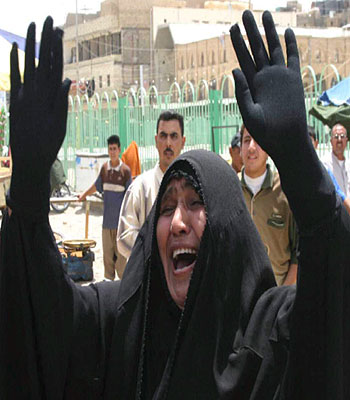
An Iraqi woman mourns the death of her relative who was killed in a suicide bomb attack, during the funeral in Najaf, south of Baghdad (EPA)
TEHRAN (Reuters) -Iran said direct talks with the United States on Iraq were impossible despite being encouraged to take part by an influential Iraqi politician, a Foreign Ministry official said on Sunday.
On Saturday, Abdul Aziz al-Hakim, head of the Supreme Council for the Islamic Revolution in Iraq (SCIRI), a key Shi’ite Muslim party closely allied to Iran, said in Tehran such direct talks could benefit both Tehran and Baghdad.
However, he told reporters he was not an intermediary carrying messages from the United States.
“Talks between Iran and the United States are in Iraq’s interests and could be in Iran’s interests as well because the United States is present in Iraq and in the region,” he said.
But Iran’s Foreign Ministry spokesman Hamid Reza Asefi on Sunday told a news conference: “We do not have talks with the United States on the agenda now.”
In March it had looked like such talks could go ahead, with Ali Larijani, secretary of Iran’s Supreme National Security Council, saying Iran would talk to the United States to help resolve problems in Iraq.
But President Mahmoud Ahmadinejad said in April such talks were not needed since a permanent Iraqi government was in place.
“Because we respected Mr. Hakim’s opinion, we accepted his request to talk to the United States but the Americans showed unreasonable and inappropriate behavior that made the talks impossible,” Asefi said.
He did not specify what the inappropriate behavior was but Iran accuses Washington of putting unfair pressure on Tehran over its nuclear work, brutal tactics in occupying Iraq and backing Israeli attacks against Palestinians.
Iran’s Supreme Leader Ayatollah Ali Khamenei has said talks can only go ahead if the United States stops its “bullying attitude.”
Washington accuses Tehran of stirring up anti-U.S. insurgents in Iraq, of funding anti-Israeli militias and of seeking nuclear warheads. Iran denies the charges.
Washington also blames Iran for the 1996 “Khobar Towers” bomb attack in Saudi Arabia that killed 19 U.S. servicemen. Tehran denies involvement.
Although Ahmadinejad’s letter to President Bush last month had a rebuking tone, it was seen by many analysts as an attempt to kindle dialogue.
Direct talks and co-operation between the United States and Iran are rare. Most famously, they met in secret during the Iran-Contra scandal in the 1980s in which the United States supplied arms to Iran in return for Tehran’s help releasing U.S. hostages held in the Lebanon.
President Akbar Hashemi Rafsanjani tried to break the ice in 1995, offering U.S. firm Conoco a $1 billion natural gas deal in the Gulf. President Bill Clinton rebuffed him.
Iran deeply resents being labeled by Bush as a member of an axis of evil,” despite having forged a working co-operation with the United States over Afghanistan in the wake of the September 11, 2001 suicide hijack attacks in the United States.

Mahmoud Ahmadinejad, Abdul Aziz al-Hakim Iranian President Mahmoud Ahmadinejad, left, shakes hands with Abdul Aziz al-Hakim (AP)

An Iraqi woman waits at the gate of a morgue of a local hospital to receive the body of her son who was killed in a car bomb explosion (EPA)
